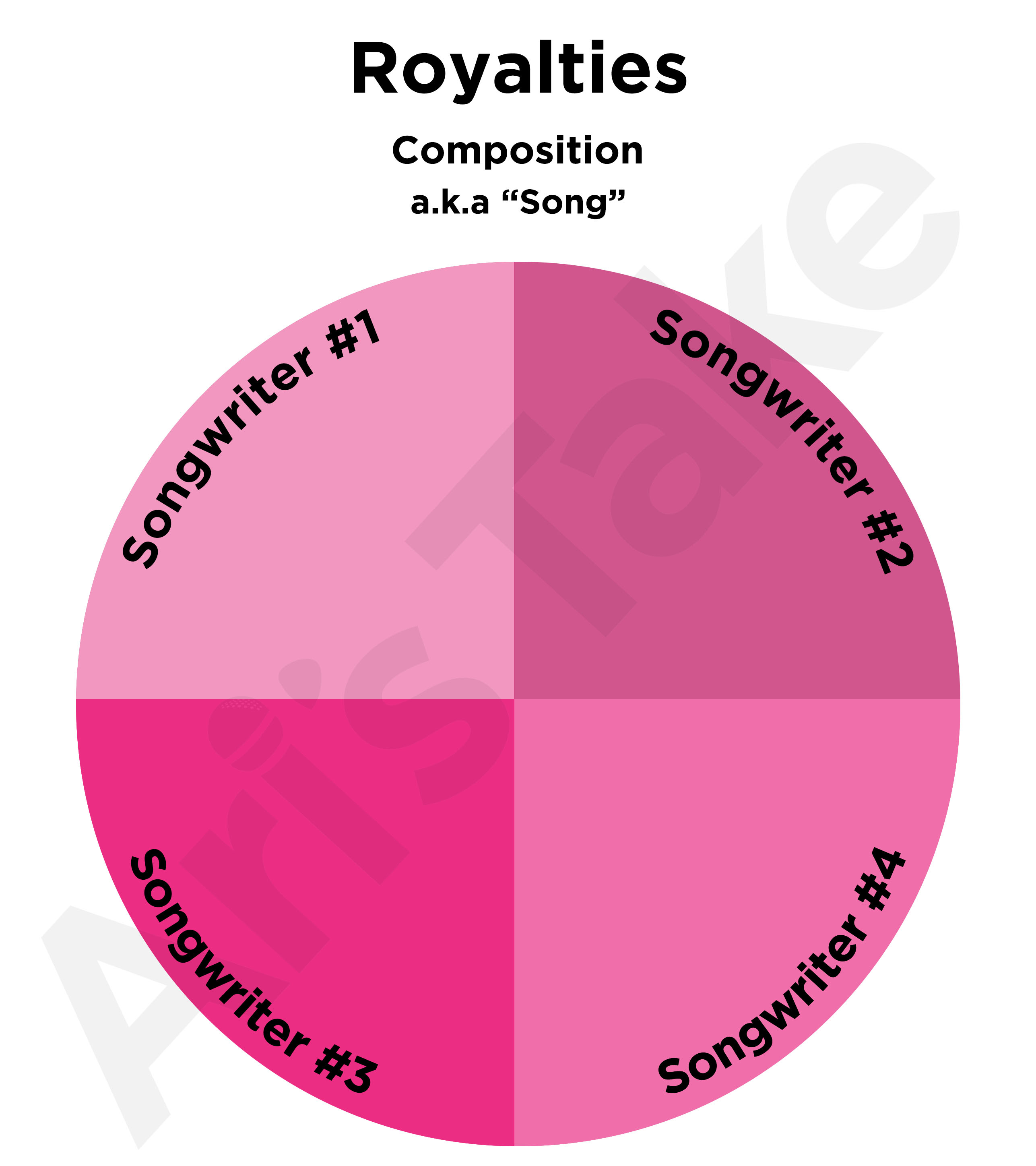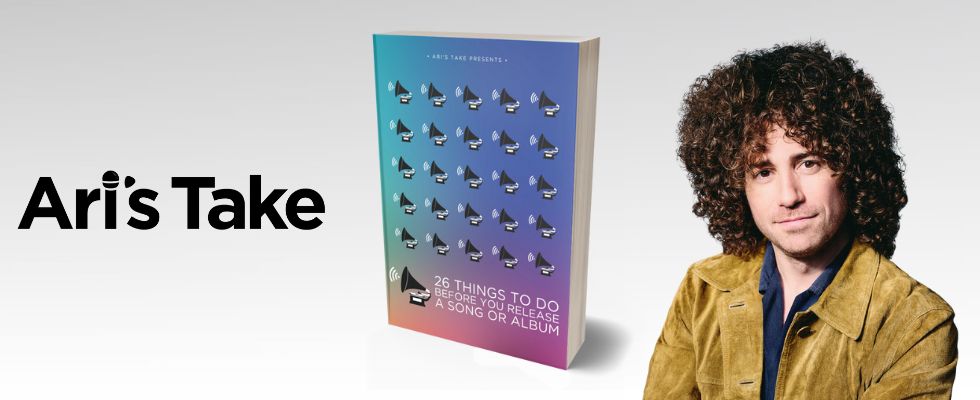My friend is a pop producer in LA.
He used to play in a progressive funk band in Minneapolis back in the day and our bands used to play shows around the Midwest together when I was a rock/pop singer/songwriter. We lived together with 5 other musicians in our house and had a rehearsal space in the basement. Our bands would make records with the same, great, Minneapolis producer who we each crowdfunded to hire.
Fast forward a decade and I’m now in a funk band and he’s an in-the-box pop producer. He’s got a great home studio and artists come over to write and record their new songs almost every day.
He calls me now, weekly (daily) and asks me when he should start charging, if he’s entitled to publishing, or any kind of ownership, what’s the difference between PRO and SoundExchange registration. And does he get any of that. A split sheet he was handed separated “music” and “lyrics.” How is THAT split up?
Helllllpppp!
We’re in very interesting times. Most producers are operating out of their home studios. And songwriting, recording and mixing sessions are all part of the same workflow.
Historically, the producer stepped into the game after the songs were all written and ready to go. The producer guided the process and worked with engineers who set up mics and turned the knobs, operated Pro Tools and whatnot. Now, the pop and hip hop producers tend to do everything: make the ‘beats’, track the vox (and all the instruments – if there are any outside of the ‘box’), mix on the spot and bounce down a decent sounding recording – all in solid days work.
Oh, and historically, producers were paid a huge sum by the major record labels in addition to ‘points.’
Now, pop and hip hop producers are typically in the room from the get-go working the song with the artist from the ground up.
How Much Do Music Producers Make and What Ownership Rights Do They Have?
Who’s owed what and at what point? How is ownership broken down? And what are producer points?!
Sound Recordings vs. Compositions vs. Masters vs. Songs
Before we get started, you have to understand a few things about how copyright and royalties are broken down. And some important terms you need to understand.
Every recording has two copyrights: 1) the sound recording and 2) the composition.
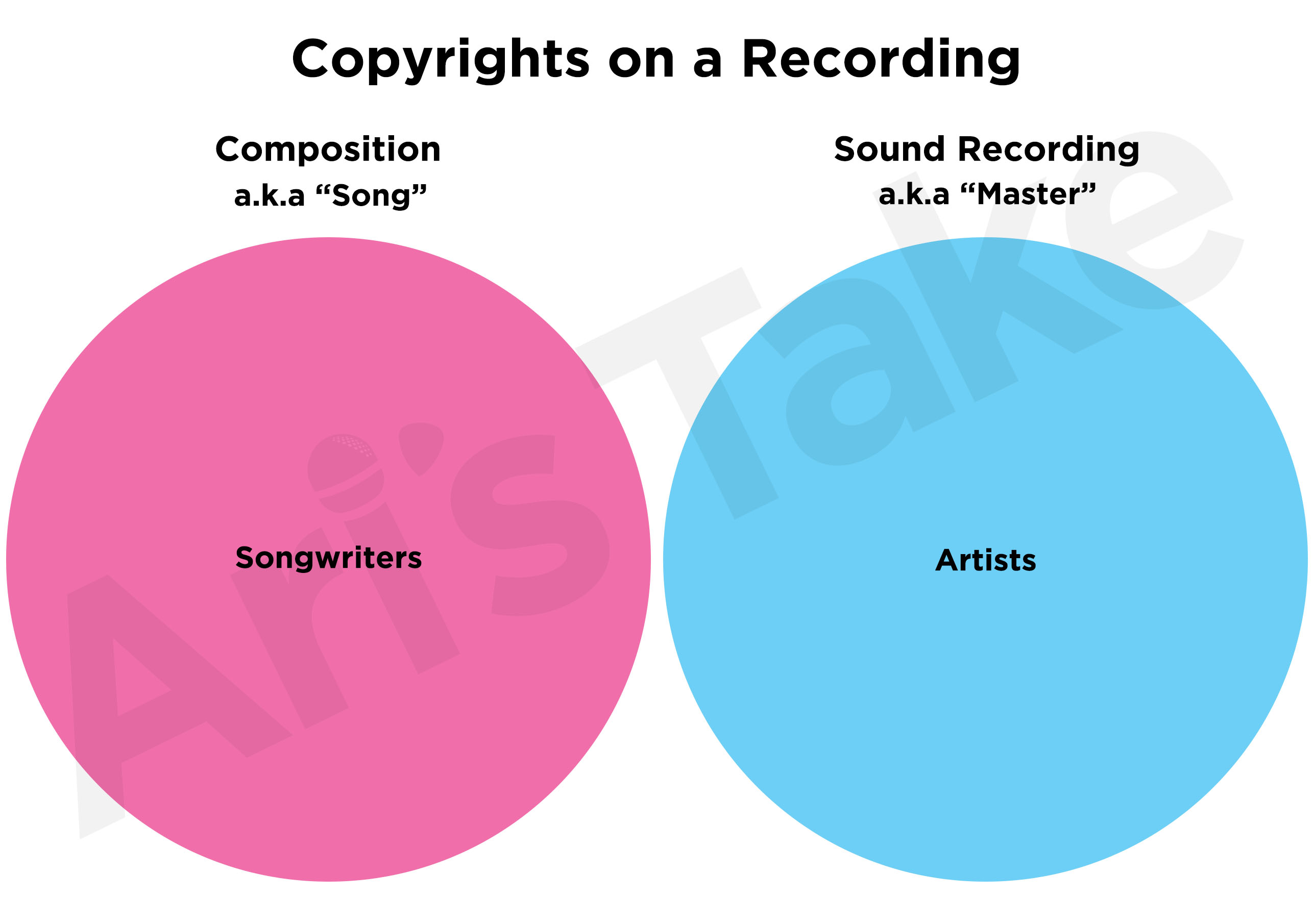
“Sound recording” is the legal term and is registered with the US copyright office as a “Sound Recording” for the “Type of Work” when you file the copyright. It is the actual recording. The producer has a hand in making this sound recording. As does the artist. This is also referred to as the “Master” in most contracts. “Master” and “sound recording” can be used interchangeably.
“Composition,” also the legal term, is registered with the US Copyright office as a “Work of the Performing Arts.” Every sound recording has an underlying composition. This is also sometimes referred to as the “Song.”
Songwriters write compositions.
Artists record sound recordings.
Sometimes the recording artist doesn’t write the composition/song. And sometimes the songwriter doesn’t record the sound recording.
If you record a cover song, you own the sound recording but not the composition. If I cover your song, I own the sound recording and you own the composition. Capiche?
+Songwriters! Registering with ASCAP or BMI is Not Enough To Get Paid
If you bring a fully finished song to a producer to help record it, typically the producer would not be entitled to any composition ownership because s/he didn’t write the song.
Publishing Companies (Songwriter Royalties) vs. Record Labels (Artist Royalties)
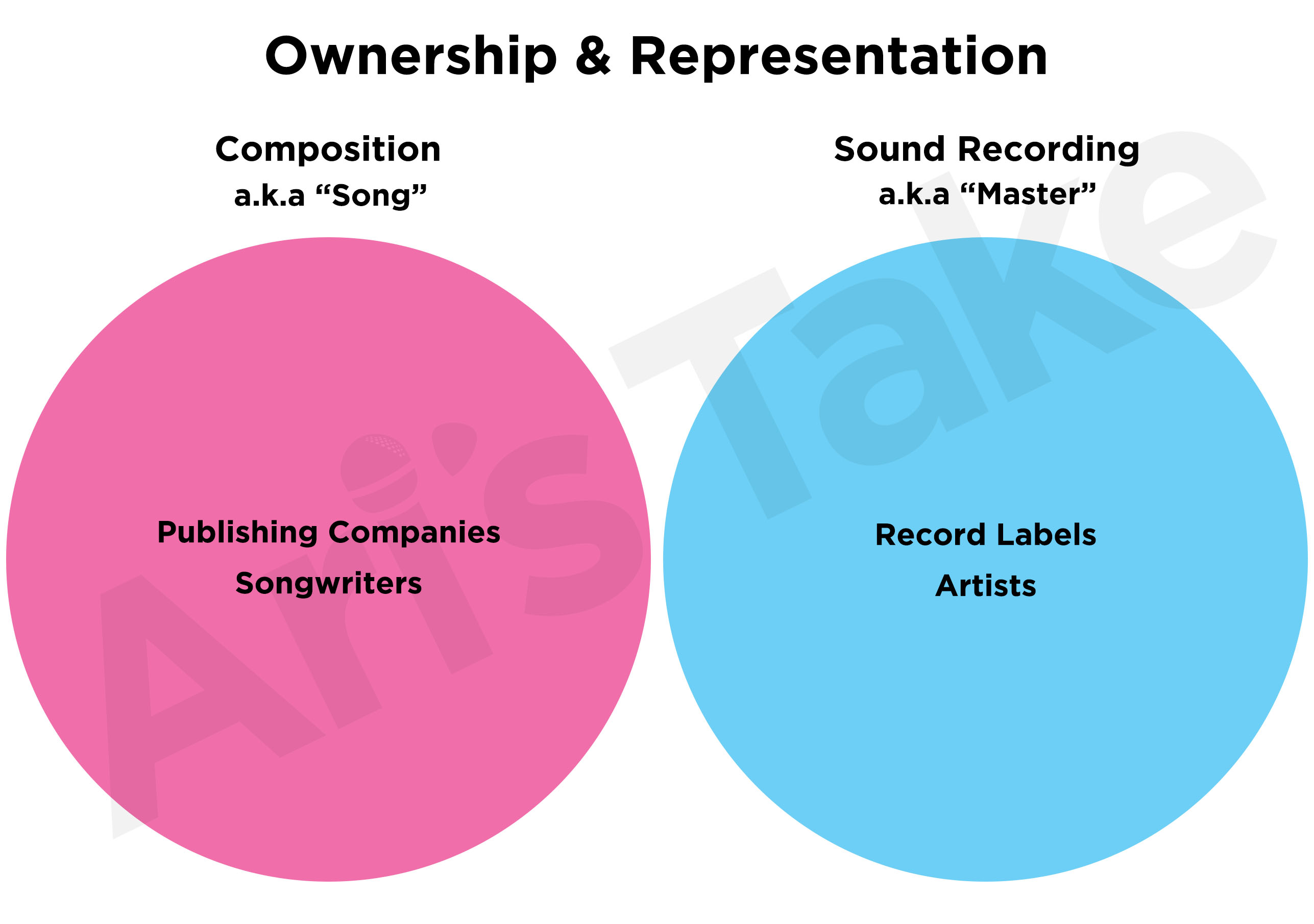
People like to toss around the word “publishing” a lot. “Who owns publishing?” “Am I getting the publishing on this?” “Where’s my publishing money?”
“Publishing,” “songwriting” and “composition” are all basically the same thing. You’re talking about songwriting ownership and royalties.
Publishing companies represent songwriters and own and/or control compositions.
Record labels represent recording artists and own and/or control sound recordings.
If you don’t have a publishing company or a record label, then you need to figure all this shit out on your own.
So let’s figure it out!
Various Music Producer Deals
Most of the time, a producer will get paid a flat fee for their work in addition to some royalties on the backend. Like, $1,500 fee to record the song plus 20% on the net royalties.
For indie artist deals (self-released or small indie label) producers are typically getting 15-25% of net royalties. “Net” is typically defined after recording costs, producer’s fee and other third party costs like distribution, manufacturing, etc and subject to recoupment. Sometimes marketing costs are included in that too. But that’s negotiable.
How Much Do Music Producers Make? Producer Points and Royalties
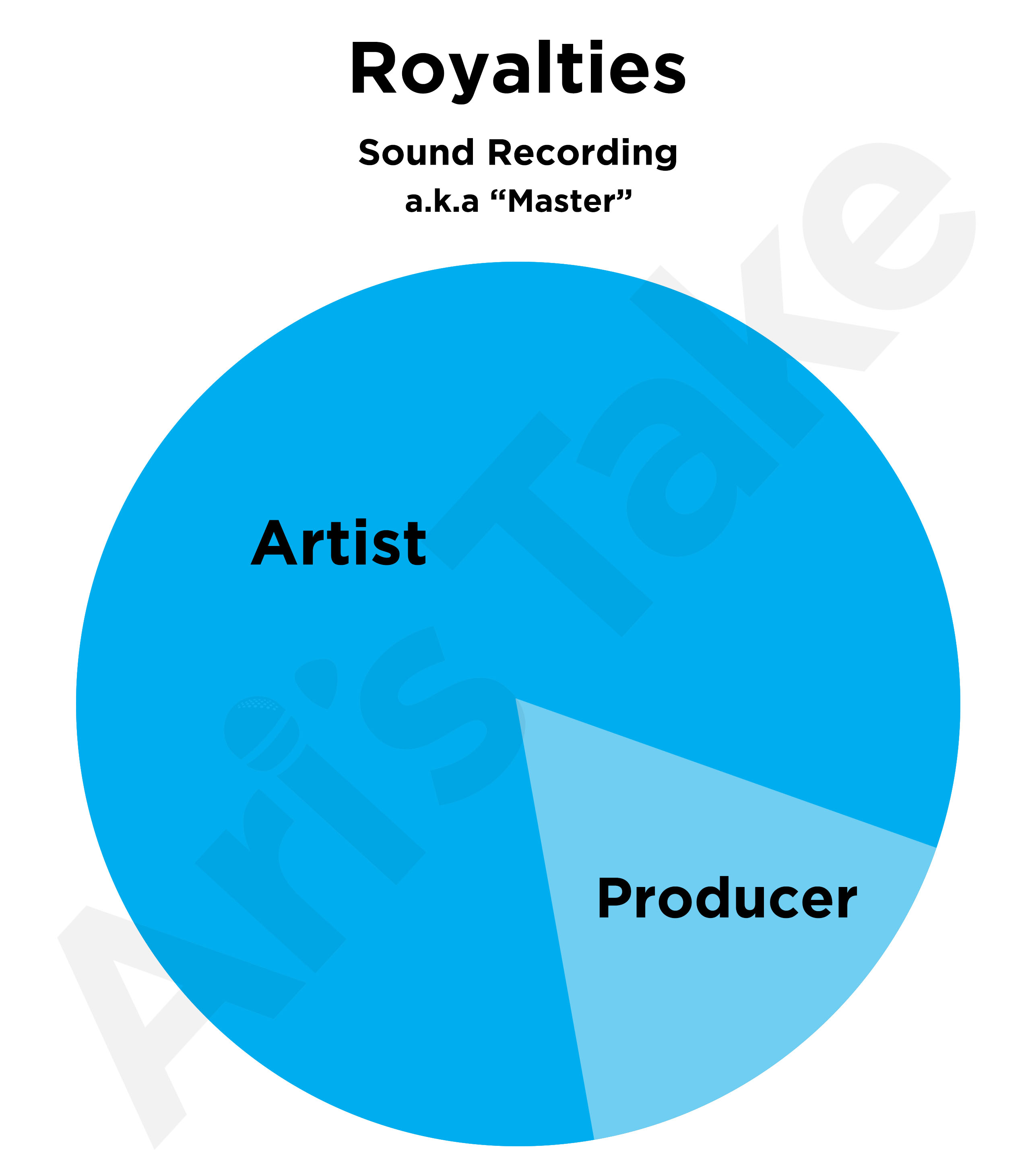
For major label deals, producers get “points.” Typically anywhere from 3-7 points. 3 points are typically for developing producers, recognizable names typically get 4-5 points and anything over 5 points are typically for superstar producers. “Points” are simply defined as percentage points of the artist’s royalty for major label deals. So, if an artist gets 18 (percentage) points for a major record deal and the producer gets 4, those 4 get subtracted from the artist’s points. If you divide 4 by 18, the producer is getting about 22% of what the artist gets. The label is still keeping 82%.
Producers get their up front fee (advance) and then their points kick in after the recording costs are recouped. But, unlike artist major label deals, once the recording costs are recouped, the producer gets paid from “record one.” Meaning, from the first sale/stream. Ultimately, to answer the question of how much do producers make from a general perspective – the exact amount will differ based on recording earnings and how many points have been allotted to them in the producers agreement.
But since most of you reading this are indie producers, artists and songwriters we’re going to spend most of our time talking about that.
You can negotiate the backend percentage based on the up front fee. More money up front, less percentage on the backend. And visa versa.
So maybe, the producer wants $3,000 up front for a “buy out” – meaning no backend percentage. But maybe the artist only has $1,500 up front to pay. So then you can kick in 15% backend or something. Or maybe the artist only has $500 to pay up front, so then the backend could be 25%.
If the artist has no money up front to pay, then it’s typically a 50/50 split of royalties – and usually ownership. But if the producer is going to get ownership then they should sign something saying that the Artist can admin the track. Since the artist is going to be the one promoting it and making all of the decisions, you don’t want the producer to be able to hold anything up.
Where the percentage numbers come from for indie deals (15-25%) is based on the major label point system. Since most producers get 3-7 points and most artist’s deals are 12-20 percentage points of sales/streams, you divide the producer point by artist point.
So, if you’re working with a “4 point producer,” you can divide 4 by 16 (typical artist points) and you get 25%. Or 4 divided by 20 would get you 20%. Or something in between. But these are obviously loose calculations because the artist royalty rate fluctuates based on the deal.
Publishing and Songwriting: How Much do Songwriters Make?
Whoever wrote the song gets publishing.
If the producer didn’t have a hand in writing the song, but just helped build a track to the song, the producer should not get any songwriting/publishing.
However, if the artist and producer build a song from scratch and basically co-write the song together, then, yes, the producer gets co-writing credit and ownership. Simply, they get “publishing.”
In Nashville they have the famous saying “One word, one third.”
Which means, when there are three people in the room, no matter what you contribute (even if just a single word) you’re entitled to equal songwriting/publishing credit. The thought is, you helped inspire the process and the energy shifted by you being in the room. The conversations you had and the ideas you tossed out guided the process.
But every genre operates differently.
In hip hop, oftentimes the producer who makes the beat will demand 50% and then the other top liners have to split up the remaining 50%.
+How To Get Songs on TV, Film and Video Games (and get paid for it)
In rock, sometimes, the band will divvy up who did what. But this gets messy. Coldplay splits everything equally 4 ways no matter what. That’s a safe bet to keep the band happy (and together).
Words and Music
Most of the time when people write a song from scratch the song is owned equally by everyone who wrote it. Music and lyrics. No one is counting words and notes to try and figure out the percentage. The only practical way that lyrics and music would get split up on the copyright registration is if you put music to a poem or something. And technically that would be a derivative work anyway and you’d need permission from the poet. Again, even the producer being in the room during the songwriting stage, they should get an equal cut. No one really is separating lyrics and music. Even in hip hop, when the producer makes the beat and keeps 50% of the composition, it’s usually listed on the copyright and registered everywhere as “Words and Music.” Even though the producer didn’t write any of the lyrics.
+How This Artist Grew To 500,000 Monthly Spotify Listeners Without Playlists
What is a Remix and How Does that Work?
Remixes are technically considered a derivative work. That’s the legal, copyrightable term. But oftentimes the remixer is paid a flat fee to remix the song and it’s considered a “work for hire” so there doesn’t need to be a new copyright registration for the composition, the producer doesn’t get publishing of the remix. Sometimes, though, the remixer will ask for a fee up front and a point or two on the backend for major label releases. For indie releases, getting 10% or so is cool. But it’s easiest if it’s just a work for hire.
Typically a remixer is not going to have ownership of anything. Not publishing and not of the master. Typically it’s easiest if it’s just a buyout.
“Hey, can you remix this song for $500?” They do. Turn it over. And you never have to pay them again and no copyright registration needs to be filed with the remixer’s name on it.
SoundExchange, PPL, Re:Sound, Neighbouring Rights and Letter of Direction
If the producer gets backend points / percentages on the master, they are entitled to all the royalties that come in for the master (sound recording). SoundExchange pays sound recording royalties for digital radio royalties in the US. PPL in the UK, Re:Sound in Canada (and most other countries’ Neighbouring Rights orgs) handles digital radio, but also all “Neighbouring Rights” which are performance royalties for sound recordings. Outside the US, these are not just for digital radio, but for terrestrial radio, TV, live venues, and any other public place music is playing. Important thing to note: as the US was not party to the Rome Convention, we don’t recognize broad sound recording performance rights, and so not all “neighbouring rights” monies are due to US performers/producers.
+What is SoundExchange, ASCAP, BMI, HFA, PROs and How Do You Get All Your Royalties?
For producers to get these points, the Artist needs to send SoundExchange (or PPL) a “Letter of Direction” with the percentage the producer is entitled to.
Who Registers What
When it comes to publishing, each songwriter must register their own splits with their publishing entities. This includes their PRO (ASCAP, BMI, PRS, SOCAN, SESAC, etc) and it includes their own publishing company or admin publishing company (like SongTrust or Sentric).
If the producer doesn’t have any writing credit, but they get backend royalties, it’s up to the Artist/label to send regular reports. Or, better yet, work with a distributor who can do payment splitting – like DistroKid or Stem. But if the payment splitting is on net royalties, then you’ll only want to turn that on after you recoup your recording costs.
Multiple Producers
Oftentimes many producers work on a single track. Typically, each producer would split up the total “producer” percentage (if there’s any other than the up front fee). So if the producer’s backend is 20% for an indie release and there are 3 producers and they decide to split this equally, then each gets about 6.66%.
What Is Your Title?
It’s important to know that even though you may consider yourself a “producer” if you had a hand in writing the song, when registering the composition with the copyright office, your publishing company and your PRO, you are NOT considered a “producer.” You are considered a “songwriter.” You wear two hats in this instance.
Similarly, if you are the “artist” and also had a hand in writing the song, when registering the composition you are NOT considered the recording artist, but the “songwriter.” And when you register, you don’t register your artist name, but rather your legal songwriter name (or a pseudonym could be used).
MUSIC SPLIT SHEET:
This is NOT a legal document and I do recommend getting a lawyer to draw up a formal agreement, but to get you started, it would be good to lay out these terms in the meantime before anyone releases anything.
Artist: Brassroots District
Producer: Greg Kurstin
Record Label / Distributor: DistroKid Ownership?: No
Automatic Payment Splitting? Yes
Song Name: Take Allotta Sweat
Date: 7/1/2019
Up front Producer fee (advance): $1,500
Producer royalty rate: 20%
Recoupable: Royalties will be payable upon recoupment of producer fee (advance) and actual recording costs along with all personnel (producer, mixing engineer, master engineer, musicians, etc )
Credit to read: Produced by Greg Kurstin
Songwriting %, PRO, Publisher and IPI#s:
Ari Seth Herstand = 25%, ASCAP, 123456789
Publisher: My Great Songs, ASCAP, 098765432
Gregory Allen Kurstin = 25%, BMI, 234234234
Publisher: Sony Music, BMI, 987987987
Thomas James Jones = 25%, SOCAN, 345345345
Publisher: Downtown Music Publishing, SOCAN, 765476543
William Knox = 25%, PRS, 456456456
Publisher: Sentric, PRS, 345634567
+Songwriters! Registering with ASCAP or BMI is Not Enough To Get Paid
Role and Responsibilities: What Does a Music Producer Do?
There are multiple kinds of producers. I go deeeeeep into this in How To Make It in the New Music Business of all the various kinds of producers out there. A music producer is a jack/jill of all trades. They know how to do a lot of things. Well. That includes technical skills (operating the DAW like Pro Tools, Logic, Ableton, FL Studio, etc) and artistic skills as well (playing various instruments, programming the ‘beat’ – instrumental foundation, and some assist in songwriting). Most producers have their own home studios. Some work out of larger studios (but that is less and less common these days). But nearly every producer (should) know gear and how to setup a major session if needed. Many producers work with sound engineers (who do the actual button pressing and mic placements and oftentimes operate the DAW), and some producers do it all themselves.
Technical and Managerial Responsibilities
A record producer who has the technical know-how of a sound engineer is ahead of the game. Some may say it’s a necessity. But in this day in age – anything goes really. People management is another important skill to have because a producer is in charge of keeping projects moving – and that means making sure the vibe is copasetic with everyone involved – from the musicians, engineers, management, label, mom, dad, girlfriend, boyfriend, you get the idea. Communication is a big part of people management skills – so knowing how to talk to people in a way that makes sense to them is a must.
Artistic Responsibilities
What does a music producer do to contribute to the artistic side of things? A lot. A music producer needs to be well rounded in everything that has to do with the full song and production. A great metaphor for this is a director of a film. A director has a complex understanding of cinematography, lighting, and sound – same goes for music producers. The ability to play various instruments is also a big plus.
Frequently Asked Questions
Is Music Production a Good Career?
Before deciding if music production is a good career, take a few editing, mixing, and mastering classes or tutorials. If you’ve been doing this for years and are just wondering if you could make money doing it – the answer is you can, but it’s definitely not a straight forward path. You don’t necessarily need a whole lot of fancy equipment to get started and there’s a lot to be learned to get to the point of working with artists. Until then, learn the ropes and scroll through my blog (and podcast) for helpful articles and tips.
+How To Be a Grammy Winning Producer from BTS and Beyonce’s DJ Swivel
Some people believe that music producers just have a ‘knack’ for the job – but the truth is that anything can be learned and ears can be trained to delve deep into music while engaging with the sound, and maximizing a song’s potential.
+Platinum Selling Producer / Songwriter for Drake, Travis Scott, Halsey, Khalid – Rogét Chahayed
What Does a Music Producer Do?
A music producer – record producer – needs to have a strong understanding of both the tech side and the artistic side of music production. Depending on your artists there are contributions you’ll make that fall along the lines of listening to demo tapes, finding the right recording space, teaming up with marketing teams, planning performances, audio editing, ghost production, and more. With all that in mind, be prepared to pick up new skills along the way and scrap a few depending on the needs of each individual artist. So the question ‘what does a music producer do’, should be more ‘what do they not do.’
+Zaytoven, ‘Godfather of Trap’ on Production in the Age of Coronavirus
How Much Do Music Producers Make?
There are too many moving factors to calculate the salary of a music producer. It all depends on producer points, royalties, etc.. A music producer’s past successes will also play a big part here. Producers usually get an up front fee + some backend master royalties and occasionally publishing if they helped write the song.
How Much Do Music Producers Make in Los Angeles?
However, most independent producers I know, charge around $1,500/song (give or take) and/or $500/day. Some ask for backend points, some don’t. This, of course, depends on what they can offer. If they can play all the instruments and have a full studio setup, that $1,500 may go directly to them. If they need to hire out a lot of assistance, that $1,500 may be divvied up amongst engineers, musicians, and studios.
How Much Do Music Producers Make in New York?
Similar to LA, it’s all over the board. Check out the Anti Social Producers Club to find producers in NYC.














